Email marketing is one of the oldest and simplest forms of digital marketing. We are in an online era where inboxes are still the most powerful touchpoints between businesses and customers. In a world filled with TikToks, YouTube Shorts, and fleeting social media trends, email marketing remains the king of return on investment (ROI).
Why is email still thriving? The answer lies in its ability to create direct, personal, and automated conversations with audiences at scale. Whether you’re an eCommerce entrepreneur, a course creator, or a local service provider expanding your reach, the right email tool can turn casual readers into loyal customers—and loyal customers into brand evangelists.
Here are some of our popular post: Top 10 best website builders, Best super foods for a healthy lifestyle, the unlimited list of free productivity apps, Best freelance site to find remote jobs, top 10 productivity hacks for entrepreneurs, 10 best side hustles to make extra money online, best online courses for learning digital skills, top 10 best free coding website
we will discuss the top 10 best email marketing platforms transforming sales in 2025. Learn which tools offer cutting-edge automation, smart segmentation, AI personalization, and unbeatable ROI to drive your business forward.
But to unlock the full potential of email, you need to be equipped with the best email marketing platforms available today. In this comprehensive guide, we’ll walk you through 10 platforms dominating the 2025 landscape, breaking down their key features, pros and cons, pricing, and—most importantly—how they help you drive sales and grow faster.
What Is Email Marketing?
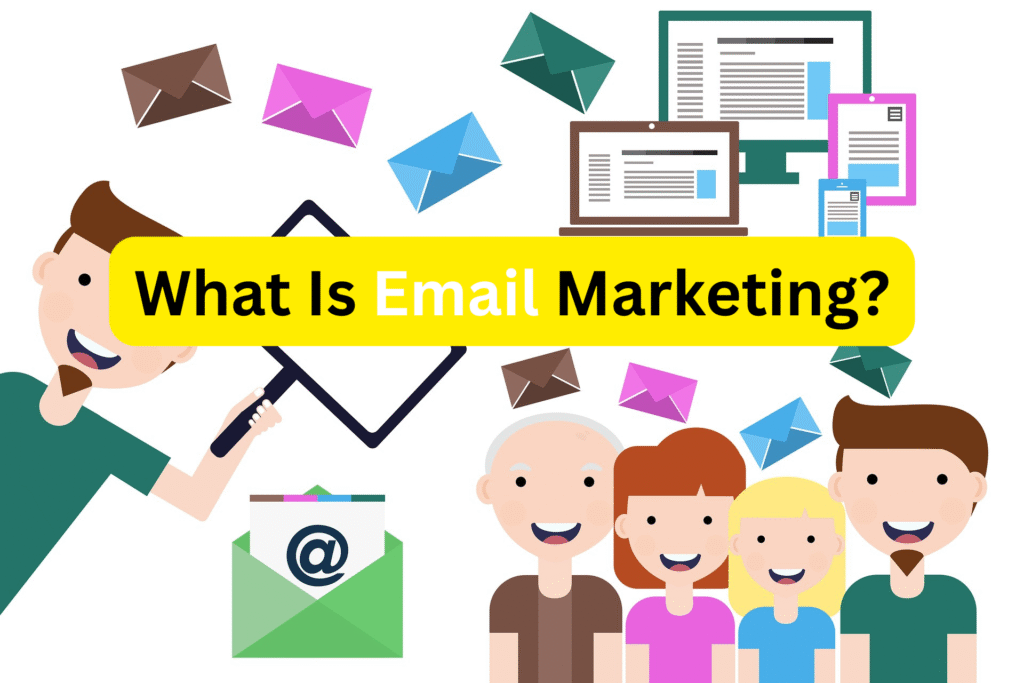
Email marketing is one of the oldest yet most effective digital marketing strategies out there. At its core, Email marketing is a digital marketing strategy that involves sending emails to a group of people—customers, leads, or subscribers—to promote products, share valuable content, nurture relationships, and ultimately drive sales. Unlike fleeting social media posts or expensive ad campaigns, email marketing is a personal, permission-based, and incredibly cost-effective approach. It’s the digital equivalent of having a direct line to your audience’s inbox.
While it may seem old school compared to TikTok or Instagram reels or Facebook ads, email still delivers. In 2025, email marketing stands as one of the most powerful tools in the world of digital marketing for businesses. According to Campaign Monitor, email marketing delivers an average ROI of $42 for every $1 spent, making it the highest-performing marketing channel in terms of return.
It all started back in 1978 with the first mass email, which generated millions in revenue. Over the years, email has evolved from simple blasts to smart, personalized messages powered by automation, segmentation, and AI. Today, with advanced tools and integrations, email marketing is more powerful than ever.
As Neil Patel says, “You own your email list. That’s power.” Which means that you have total control over your mailing list, unlike other social media platforms that can be taken down at any moment. And with the right platform, that power can translate into serious sales.
In this post, we’ll explore the 10 best email marketing platforms leading the game in 2025—and how they can help you grow faster, sell smarter, and connect better with your audience.
What Makes a Great Email Marketing Platform?
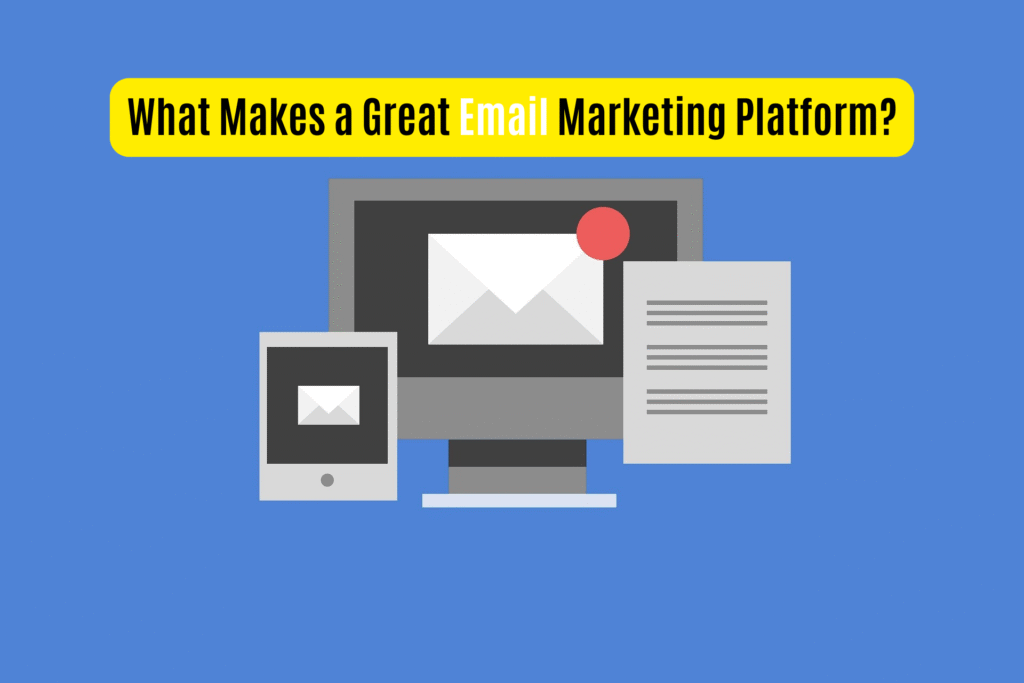
Not all email marketing tools are created equal. The difference between mediocre results and massive ROI often lies in the features a platform offers—and how well those features align with your business goals. As more businesses compete for space in the inbox, the best email marketing platforms in 2025 are those that do more than just send emails. They create systems that convert leads into loyal customers.
#1. Automation capabilities are non-negotiable. A great platform should allow you to set up workflows that trigger emails based on customer actions—whether that’s signing up for a list, abandoning a cart, making a purchase, or even just browsing a particular category on your site. This kind of behavior-based automation means your emails arrive exactly when they’re most relevant, increasing open rates and driving more conversions without requiring manual effort.
#2. Advanced segmentation is crucial for reaching the right audience with the right message. The best email marketing platforms give you the tools to divide your audience into targeted groups based on specific criteria such as demographics, purchase history, geographic location, engagement frequency, or even custom events. When your messages are precisely tailored, your readers feel like you’re speaking directly to them, boosting trust, relevance, and ultimately, sales.
#3. A/B testing or split testing allows you to fine-tune every part of your email campaign. Whether you’re testing different subject lines to improve open rates, comparing call-to-action buttons to increase clicks, or experimenting with layout and visuals to boost engagement, this feature helps you make data-driven decisions. The best platforms make this process seamless and present the results in actionable reports.
#4. Deep integration with eCommerce systems. If you run an online store, you need your email marketing tool to sync effortlessly with platforms like Shopify, WooCommerce, Magento, or BigCommerce. This enables real-time product data to flow into your emails, supports personalized product recommendations, and makes it easy to track exactly how much revenue each email generates. Without this connection, your campaigns lack the power to scale intelligently.
#5. Real-time analytics and reporting capabilities are equally important. You should be able to monitor how each campaign is performing across metrics like open rate, click-through rate, bounce rate, unsubscribes, and most importantly, revenue attribution. This visibility gives you the power to tweak, optimize, and maximize every campaign, ensuring you’re not just reaching people, but influencing their buying decisions.
#6. Personalization and dynamic content are what truly elevate a platform from functional to exceptional. In 2025, static email blasts no longer cut it. Consumers expect experiences that feel custom-made. The best email marketing platforms use AI-powered tools to create emails that change depending on who’s receiving them. From using a subscriber’s first name to showing product recommendations based on browsing habits, dynamic content ensures your emails feel like a one-on-one conversation, without having to manually craft every message.
Together, these six capabilities form the foundation of what makes an email marketing tool worth investing in. When these features are combined into one platform, businesses can deliver emails that are personalized, timely, and strategically designed to generate sales. That’s the real power behind the best email marketing platforms: they don’t just help you communicate—they help you convert.
The 10 Best Email Marketing Platforms to Boost Sales
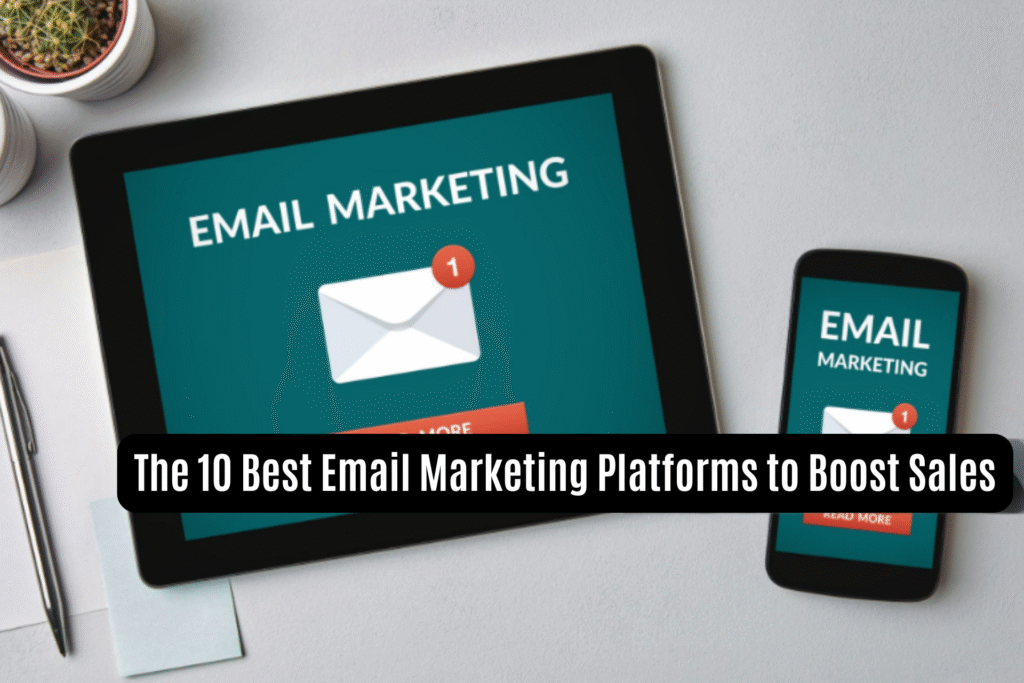
Let’s get into the 10 best email marketing platforms that are helping businesses crush their sales targets in 2025.
#1. Klaviyo
Klaviyo has quickly become one of the best email marketing platforms for e-commerce. It integrates natively with Shopify and WooCommerce, making it easy to track customer behavior and trigger personalized flows based on real-time data. Whether it’s sending abandoned cart emails, upselling after purchase, or offering exclusive loyalty perks, Klaviyo turns insights into conversions. Its predictive analytics even help forecast customer lifetime value and future purchases, giving marketers a serious competitive edge.
#2. ActiveCampaign
If you’re running a small to mid-sized business and need a serious automation powerhouse, ActiveCampaign is your go-to. It combines robust email tools with CRM and sales automation, making it ideal for businesses that want to align marketing and sales. You can build customer journeys using advanced logic, segment users down to granular details, and score leads based on engagement. It’s powerful, but worth the learning curve—especially if long-term growth and sales conversion are your goals.
#3. MailerLite
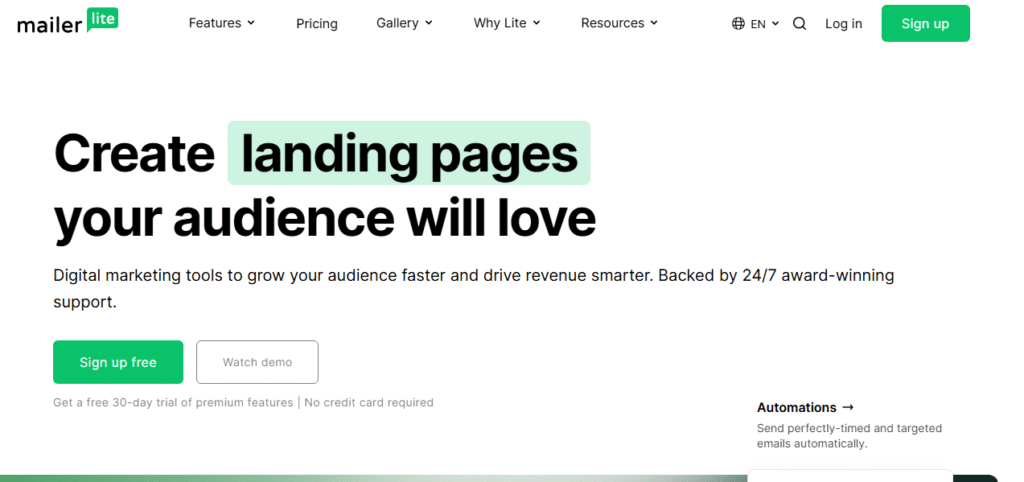
MailerLite is proof that affordable doesn’t mean basic. Loved by solopreneurs, bloggers, and small teams, this platform offers a clean, intuitive interface with plenty of powerful features, like automation, landing pages, surveys, and even paid newsletter tools. For startups that want simplicity, speed, and solid results without overcomplicating the process, MailerLite is one of the best email marketing platforms in its class.
#4. ConvertKit
Tailored for creators, course builders, and digital entrepreneurs, ConvertKit excels in email automation for audience-building. It uses a tag-based system for managing subscribers, allowing creators to segment based on interest, behavior, or product purchased. You can sell digital products directly from your emails and automate your sales funnels without leaving the platform. If you’re a YouTuber, blogger, or online educator, ConvertKit is engineered to grow your influence and income.
#5. Omnisend
Omnisend goes beyond email—it’s a multi-channel marketing platform designed specifically for eCommerce brands. It combines email, SMS, and push notifications in one dashboard, making it easy to send coordinated messages across platforms. You can build custom workflows for welcome sequences, cart recovery, and order confirmations while tracking sales attribution in real time. For stores that want to meet customers across every touchpoint, Omnisend is one of the most comprehensive and best email marketing platforms available.
#6. HubSpot Email Marketing
HubSpot is known for its full suite CRM and marketing tools, and its email platform is no exception. Built to serve growing teams and medium-to-large businesses, HubSpot combines email marketing with lead nurturing, landing pages, CRM, and analytics. You can track customer interactions across channels and tailor content based on lifecycle stages. Although pricing increases as you scale, its deep capabilities make it worth every penny for businesses with high growth ambitions.
#7. Moosend
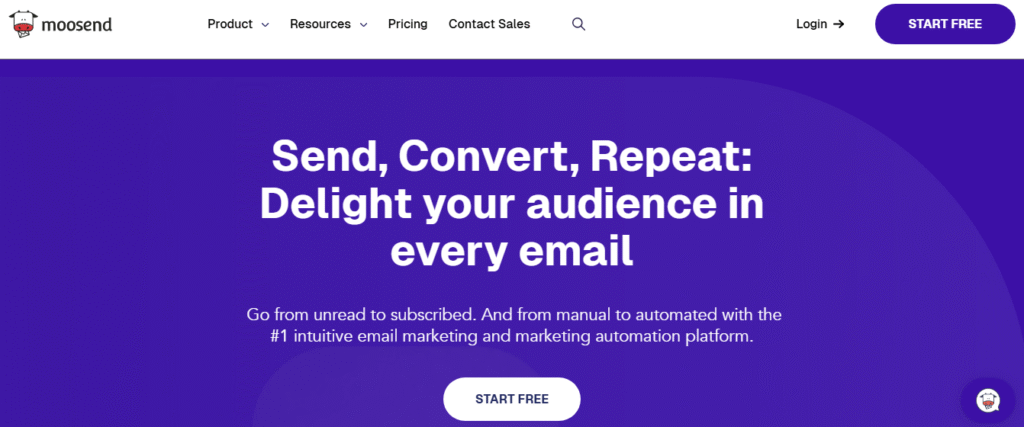
Moosend is a budget-friendly solution packed with smart features. Its AI engine allows for personalized product recommendations, while countdown timers and weather-based content add creative flair to campaigns. Despite its lower price point, it doesn’t skimp on automation or analytics. Ideal for small businesses that want powerful tools without enterprise-level pricing, Moosend is carving out its spot among the best email marketing platforms for scrappy marketers.
#8. Drip
Drip focuses on lifecycle marketing for online stores. It connects behavioral data with automation to create hyper-relevant messages across the customer journey. Whether you’re nudging someone back to their abandoned cart or sending a birthday discount, Drip makes it feel effortless. It also provides visual workflows and deep analytics, helping marketers optimize every stage of their sales funnel with precision.
#9. GetResponse
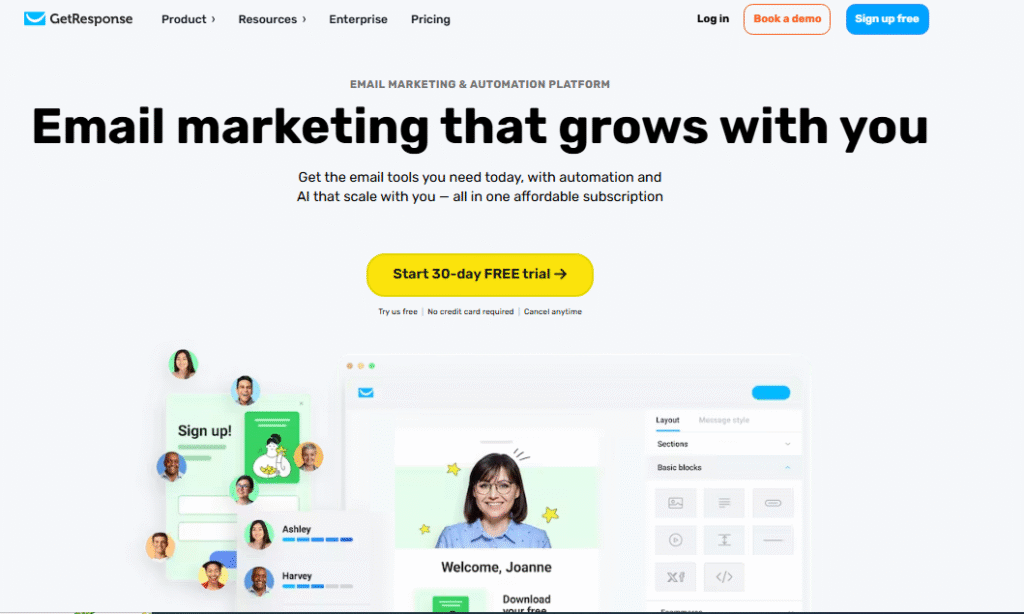
GetResponse is one of the most versatile email platforms in the market. It combines email, webinars, landing pages, SMS, and marketing automation all in one place. Designed for businesses that want an all-in-one system, GetResponse offers a unique AI email generator and a full conversion funnel builder. If you’re running lead magnets, online events, and product launches, this is one of the best email marketing platforms to handle it all seamlessly.
#10. Benchmark Email
Benchmark Email is an underrated gem, especially for international businesses. It offers strong support for multilingual campaigns, simple automation, and location-based engagement reports. While it may lack some of the advanced AI features of its competitors, Benchmark makes up for it with ease of use and global reach. It’s a great option for companies operating in multiple markets that need reliable, localized messaging.
Comparing the Platforms
Choosing among the best email marketing platforms often comes down to features, budget, and business size. Here’s a quick comparison table to help you decide:
| Platform | Ideal For | Free Plan | Starting Price | CRM/Automation | Multi-Channel |
| Klaviyo | E-commerce brands | ✅ | $20/month | Advanced | ❌ |
| ActiveCampaign | SMBs & B2B companies | ❌ | $29/month | Advanced | ❌ |
| MailerLite | Solopreneurs | ✅ | $10/month | Moderate | ❌ |
| ConvertKit | Creators | ✅ | $15/month | Moderate | ❌ |
| Omnisend | Online stores | ✅ | $16/month | Advanced | ✅ (SMS/push) |
| HubSpot | Scaling businesses | ✅ | $45/month | Enterprise | ✅ |
| Moosend | Budget-conscious SMBs | ❌ | $9/month | Moderate | ❌ |
| Drip | eCommerce lifecycle | ❌ | $39/month | Advanced | ❌ |
| GetResponse | All-in-one marketing | ✅ | $19/month | Advanced | ✅ |
| Benchmark Email | Global campaigns | ✅ | $13/month | Basic | ❌ |
Conclusion: Best email marketing platform
There’s no one-size-fits-all when it comes to choosing the best email marketing platform. What matters most is finding a tool that fits your goals, streamlines your strategy, and drives consistent results. Whether you’re a solopreneur just starting or a fast-growing business scaling across channels, there’s a platform here to help you build meaningful relationships—and close more sales.
Here are some of our popular post: Top 10 best website builders, Best super foods for a healthy lifestyle, the unlimited list of free productivity apps, Best freelance site to find remote jobs, top 10 productivity hacks for entrepreneurs, 10 best side hustles to make extra money online, best online courses for learning digital skills, top 10 best free coding website
When selecting from the best email marketing platforms, start with clarity. Define your business goals. Are you nurturing cold leads? Driving eCommerce sales? Launching a product? Once you understand your objectives, consider your budget, team size, and the tools you already use—like Shopify, WordPress, or a CRM.
Free plans can be a great starting point, but make sure they offer room to scale. If you’re planning rapid growth, prioritize platforms with powerful automation and integrations from the start. And don’t forget to test! Most platforms offer free trials, allowing you to experiment with ease of use, deliverability, and performance.
Start small if you need to. Test often. And remember—email isn’t just about reaching inboxes. It’s about creating value, nurturing trust, and turning messages into money.


